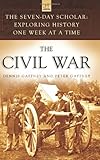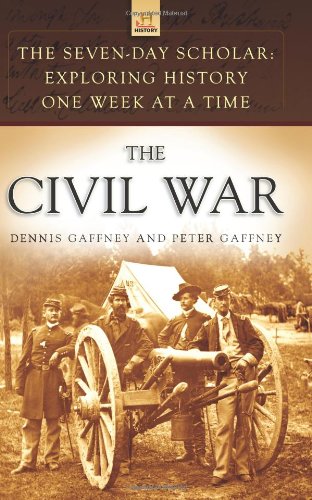Review for The Seven-Day Scholar: The Civil War: Exploring History One Week at a Time (The Seven-Day Scholar: Exploring History One Week at a Time)


We offer a book The Seven-Day Scholar: The Civil War: Exploring History One Week at a Time (The Seven-Day Scholar: Exploring History One Week at a Time) This book gives you a special price. Offers free shipping on purchases over $ 25 at Amazon.com now before stock runs out.
Review for The Seven-Day Scholar: The Civil War: Exploring History One Week at a Time (The Seven-Day Scholar: Exploring History One Week at a Time)
The Seven-Day Scholar: The Civil War: Exploring History One Week at a Time (The Seven-Day Scholar: Exploring History One Week at a Time) Review
What is the Seven Day Scholar?
The Seven-Day Scholar is a reader-friendly way to learn history. It takes what is often daunting--the entire Civil War in the first volume of the series, for example--and breaks it into shorter, easy-to-digest, one-page stories. Read seven related stories, which make up each chapter, and you're a "Seven-Day Scholar" in that week's topic (e.g. Gettysburg, the Election of 1860, etc.). The book has 52 chapters that take you through the war from beginning to end.
How is different from other Civil War books?
Many Civil War books are narrow in scope--they cover a single battle, or a single person. The Seven Day Scholar provides the entire story, but it doesn't do so in multi-volumes or with reams of detail. This is history through story, which is the way most people like to learn history, whether it's about their family or the nation. So you can read the Seven Day Scholar from beginning to end like a novel or you can dip in and out as you would with a good reference book to read about what most interests you.
Is this book for people who don't know anything about the Civil War or is it more for Civil War buffs?
It's for both. All readers come away understanding the arc of the Civil War. But we also included stories and interpretations that surprise Civil War buffs who think they've heard it all before. A lot of people don't know that William Tecumseh Sherman was demoted for insanity before he became a great Union general. Or that privates weren't cannon fodder in the Civil War, but that generals were. Or that the song "Dixie" might have originally been written by black Northern musicians. Or that Lincoln proposed sending freed slaves abroad.
Lincoln wanted to send freed slaves abroad?
Lincoln advocated the emigration of freed slaves before and during his presidency in a policy called colonization. But we've forgotten many things about Lincoln. He was overwhelmed when he first came into office. At the start of the conflict, he would have been happy to have the Southern states return to the Union with slavery intact. He resisted turning the war into one of emancipation. The scholar W.E.B. Dubois wrote, "I love him not because he was perfect but because he was not and yet triumphed. . . . I revere him the more because up out of his contradictions and inconsistencies he fought his way to the pinnacles of earth and his fight was within as well as without. I care more for Lincoln's great toe than for the whole body of the perfect George Washington. . . ."
Were there surprises in the research?
We were endlessly surprised. We didn't know that a third of the soldiers who fought in the Union army were immigrants. Or that Lincoln was once shot through his stove-pipe hat in an earlier assassination attempt. We didn't realize how much civilians suffered. Or that Robert E. Lee might have been the man who was most responsible for ending the war.
How so?
He refused to engage in a guerilla war, which might have extended the war for years.
Why are people so interested in the Civil War?
The war was like a train wreck that included members of our own family; it's hard for us to turn our gaze away. Over 600,000 men died, and sometimes nearly entire towns of young men were wiped out in a single battle. The slaughter in some battles--in Fredericksburg, or Cold Harbor, or at Gettysburg--is almost beyond comprehension. But the war also became about the freedom of slaves, and on that level it became heroic. There's a redemption to the suffering. It's like the nation had to slay a monster, which was slavery, and it did so, but at a terrible cost. I'm convinced that if we're still around in a few hundred years, the piece of American history that people will read first will be the Civil War.
The great figures are also fascinating, epic figures--Lincoln, Grant, and Sherman in the North and Davis, Lee, Jackson, Stuart in the South . . . And the women, such as Clara Barton, Harriet Tubman, and Phoebe Pember. Our consultant Charlie Bryan turned us on to one woman, Cornelia McDonald, who was a Virginian mother with nine children who wrote a diary that conveys her struggle during the war just to feed her family and keep her home during the war--and to keep her sanity.
And the Civil War was the first American war that was heavily documented in diaries, letters, and photos. They make it clear this was a real war suffered through by real people we can relate to.
"A bite of history a day, all year long."
Flawless storytelling, expert research, and a whole new way of providing history in intriguing, one-page essays makes The Seven-Day Scholar: The Civil War a book that anyone interested in the topic will want on their bookshelf.
This volume in the Seven-Day Scholar series brings to life significant moments in our nation's heroic tragedy, the Civil War, and coincides with its 150th anniversary. The book is organized into fifty-two chapters, corresponding to the weeks in a year; and each week has a theme--what ignited the war, Antietam, soldiers' food and drink, the 54th Massachusetts, the Gettysburg Address, Vicksburg, medical care, Lincoln's assassination, why the North won, and many more. Each chapter includes seven related narrative entries, one for every day of the week. These one-page entries, which read like historical fiction, bring to life crucial political decisions, unforgettable people, key battlefield moments, scholarly debates, and struggles on the home front.
The book also explores many little-known episodes, answering questions such as:
- Why did Jefferson and Varina Davis take in a mixed-race child during the war?
- What were the causes of riots in New York City and Richmond?
- Why was General William Sherman demoted for "insanity"?
- Why did the Union Army turn Robert E. Lee's estate into a cemetery?
Entries also include follow-up resources where curious readers can learn more.
Readers can sweep through the book from beginning to end, or use it as a reference book, periodically dipping in and out of topics they want to explore. This is the perfect book for history buffs, and for those who missed out on learning about this captivating period in American history. Readmore .. .
We recommend that you check the price of the book The Seven-Day Scholar: The Civil War: Exploring History One Week at a Time (The Seven-Day Scholar: Exploring History One Week at a Time), with this product is out at Amazon.com.!!Check Price Now!!


The Seven-Day Scholar: The Civil War: Exploring History One Week at a Time (The Seven-Day Scholar: Exploring History One Week at a Time)


Stainless Steel Pot Rice Cooker - Miracle Stainless Steel Rice Cooker - Non Teflon Rice Cooker


ไม่มีความคิดเห็น:
แสดงความคิดเห็น